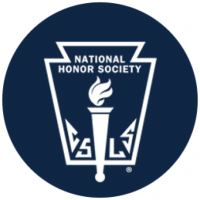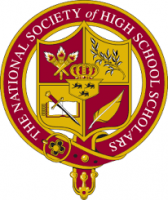Q. What is NHS?
A. The National Honor Society (NHS) and National Junior Honor Society (NJHS) are the nation’s premier organizations establised to recognize outstanding high school and middle level students. More than just an honor roll, NHS and NJHS serve to honor those students who have demonstrated excellence in the areas of Scholarship, Leadership, Service, and Character (and Citizenship for NJHS). These characteristics have been associated with membership in the organization since their beginnings in 1921 and 1929.
Q. How do I become a member of NHS?
A. Prospective candidates for NHS are junior or senior students who have completed at least one full semester at Dr. Phillips High School. The basic requirements for consideration of membership are as follows:
- Completed candidate information form.
- Printed documentation that verifies previously completed service hours record with DPHS. The requirement is 50 hours for juniors and 75 hours for seniors.
- Currently hold a 3.50 cumulative weighted GPA.
- A letter of character reference from an adult in the community.
- Three (3) academic teacher recommendations. Recommendations must be requested and agreed upon from the teachers before being submitted as part of the application.
- Documentation of at least one leadership role held at school or in the community since ninth grade.
Q: I received something in the mail from the NSHSS. Is that the same as NHS? If I join the NSHSS, then am I considered a member of NHS already?

 A: The National Society of High School Scholars is a different organization from National Honor Society, although their stated aims of encouraging academic excellence are similar. NSHSS contacts students through the mail and invites them into membership. NHS membership at DPHS is only offered after a student applies and is invited by confirmation by the faculty council. Joining NSHSS does not make you a member of our NHS chapter or permit you to walk with NHS recognition at graduation.
A: The National Society of High School Scholars is a different organization from National Honor Society, although their stated aims of encouraging academic excellence are similar. NSHSS contacts students through the mail and invites them into membership. NHS membership at DPHS is only offered after a student applies and is invited by confirmation by the faculty council. Joining NSHSS does not make you a member of our NHS chapter or permit you to walk with NHS recognition at graduation.
You can tell the difference between the two organizations by their logo and colors. National Honor Society materials are blue and gold.
Q: What are my obligations once I become a member?
A: The following is a list of the basic requirements of membership in NHS:
• Dues (Article IV, Section 3): New members will be asked to pay chapter dues of $20. The chapter is able to provide alternative sources of funding for those students who may be incapable of paying due to legitimate circumstances.
• Maintaining standards (Article VIII, Section 1): All members are expected to maintain the standards by which they were selected.
• Meetings (Article XIII, Section 1): The chapter will hold periodic meetings and may require members to attend. The schedule of these meetings will be well publicized.
• Individual Service Project(s) (Article XIV, Section 4): Members are to engage in a minimum of twenty-five (25) service hours per academic year. The location and activity for which these hours are done is not specified and should be completed according to members own talents and interests. Verification of service hours performed must be appropriately documented and submitted by the prescribed due date.
Q: What are the consequences if I do not fulfill these obligations?
A: Violation of NHS principles, member requirements, school rules, or civil law will result in a probation or in certain situations the severity of the offense can result in immediate consideration for dismissal. (NHS National Constitution; Article X: Discipline and Dismissal, Section 2)
Q: What specific actions will result in a probation?
A: The following infractions will result in a probation:
a.) Failure to maintain a 3.5 weighted GPA.
b.) Failure to earn the required service hours per nine weeks.
c.) Failure to submit appropriate documentation of required service hours by the due date.
d.) Failure to attend a given class (i.e. skipping class).
e.) Documented instance of cheating or plagiarism.
Q: What happens if I receive a probation?
A: Members who fall below the standards that were the basis for their selection shall be promptly warned in writing by the chapter adviser and given a reasonable amount of time to correct the deficiency, except that in the case of flagrant violation of school rules or the law, a member does not have to be warned. (NHS National Constitution; Article X: Discipline and Dismissal, Section 2)
Members who fail to correct their inadequacies within one nine week period shall be considered for dismissal. (DPHS NHS Chapter Bylaws; Article X: Probation, Section 3)
Q: How many probations can I receive and still be a member?
A: The Faculty Council shall determine when an individual has exceeded a reasonable number of warnings. (NHS National Constitution; Article X: Discipline and Dismissal, Section 3)
Members who warrant a second probation for the same offense may be subject to immediate consideration for dismissal, as determined by the faculty council. (DPHS NHS Chapter Bylaws; Article XI: Dismissal, Section 3)
Q: Is there anything that would warrant immediate consideration for dismissal?
A: Grounds for immediate consideration for dismissal include the following flagrant violations of school rules and/or civil law:
a.) cheating
b.) fighting
c.) substance abuse
d.) stealing
e.) any other offence that prompts suspension from school
f.) harassment
g.) conduct deemed by the NHS Faculty Council to be in violation of the pillars of character, scholarship, service or leadership
(DPHS NHS Chapter Bylaws; Article XI: Dismissal, Section 2)
Q: If I am dismissed, or resign, from NHS can I apply again?
A: No.
Members who resign or are dismissed are never again eligible for membership or its benefits. (NHS National Constitution; Article VIII: Membership, Section 7)
Q: Who is the Faculty Council?
A: The Faculty Council shall consist of five (5) voting faculty members appointed annually by the principal. The chapter adviser shall be an ex officio, nonvoting, sixth member of the Faculty Council. No principal or assistant principal may be included on the Faculty Council. (NHS National Constitution; Article VII: The Faculty Council, Section 1)
